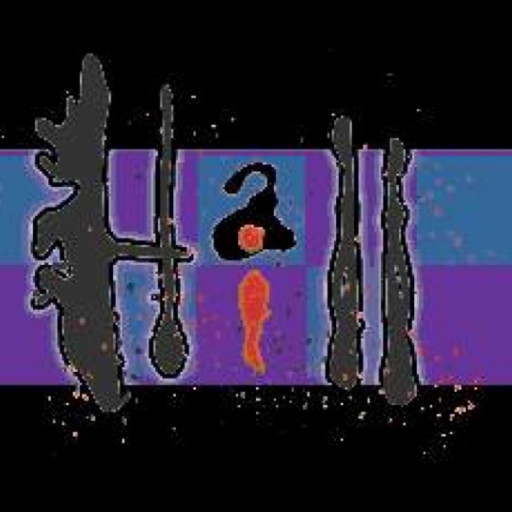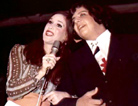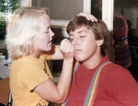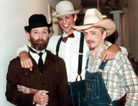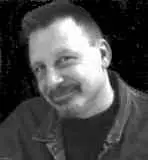Nova Performing Arts
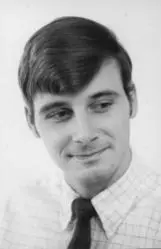 Allen came to the Nova faculty directly from school (College Conservatory of Music, Cincinnati) in 1968.Nova was on ‘long’ years at that time so he graduated in May and began teaching in June. Allen’s first year of teaching was in his words “something akin to Hell.” As the ‘new kid on the block’ or ‘low man on the totem pole’ or however you want to say it, his main assignment was hundreds of 7th and 8th graders in a required class called Experiences in Music. He completed that year through sheer determination and an intense desire to ‘not be a quitter or a failure in the eyes of his parents who had worked very hard to pay for his conservatory education.’ At the end of that year a very disillusioned young (21 year old) man went to the front office to resign. This came as a total surprise to the administration who made the broad statement “reaction to your teaching has been excellent, what can we do to keep you? What do you want?” Allen came to the Nova faculty directly from school (College Conservatory of Music, Cincinnati) in 1968.Nova was on ‘long’ years at that time so he graduated in May and began teaching in June. Allen’s first year of teaching was in his words “something akin to Hell.” As the ‘new kid on the block’ or ‘low man on the totem pole’ or however you want to say it, his main assignment was hundreds of 7th and 8th graders in a required class called Experiences in Music. He completed that year through sheer determination and an intense desire to ‘not be a quitter or a failure in the eyes of his parents who had worked very hard to pay for his conservatory education.’ At the end of that year a very disillusioned young (21 year old) man went to the front office to resign. This came as a total surprise to the administration who made the broad statement “reaction to your teaching has been excellent, what can we do to keep you? What do you want?” Things were slow to change but change they did. The first bone thrown to our restless conservatory graduate in 1969 was an after hours music group called AITUVUS (pronounced 8 of us). Singing, dancing (movement) costumes, and accompanied by guitars, bass and piano, the group was a hit very fast. Of course Things were slow to change but change they did. The first bone thrown to our restless conservatory graduate in 1969 was an after hours music group called AITUVUS (pronounced 8 of us). Singing, dancing (movement) costumes, and accompanied by guitars, bass and piano, the group was a hit very fast. Of coursea little is never enough, so Allen wanted to do a musical. Everyone said “you need to go talk to Joyce Hall” so he did, and I guess you could say they never stopped talking.  At that time Nova didn’t have any performing area so the West LL (Language Lecture) hall was transformed into a small theatre in the round and the first collaborative production was mounted. The 1970 Fantasticks was a big success. It is interesting to note that the program listed the director as Allen Hill and thanked Joyce Hall for her assistance. Joyce was a little reluctant to jump into this new venture due to some less than pleasant experiences before Allen arrived. But it didn’t take long. Still teaching full schedules, music for Allen and English for Joyce, they ‘co-directed’ the next show. In 1971, The Roar of the Greasepaint, The Smell of the Crowd took over the East LL and really turned it into a theatre. At that time Nova didn’t have any performing area so the West LL (Language Lecture) hall was transformed into a small theatre in the round and the first collaborative production was mounted. The 1970 Fantasticks was a big success. It is interesting to note that the program listed the director as Allen Hill and thanked Joyce Hall for her assistance. Joyce was a little reluctant to jump into this new venture due to some less than pleasant experiences before Allen arrived. But it didn’t take long. Still teaching full schedules, music for Allen and English for Joyce, they ‘co-directed’ the next show. In 1971, The Roar of the Greasepaint, The Smell of the Crowd took over the East LL and really turned it into a theatre. Unveiled within the next year or so was the architectural wonder, the Nova Cafetorium. About a 6 foot proscenium, a highly lacquered stage floor of light wood, a beige cyclorama, and enough power to run 3 or 4 stage lights. However when you have nothing and you get something, you take it. Unveiled within the next year or so was the architectural wonder, the Nova Cafetorium. About a 6 foot proscenium, a highly lacquered stage floor of light wood, a beige cyclorama, and enough power to run 3 or 4 stage lights. However when you have nothing and you get something, you take it.In addition to the luck of Joyce, Allen and eventually the master band director Tom Williams landing in the same place, it just happened that Nova was in one of its more creative phases where inter-curricular course development was encouraged. It didn’t take Joyce and Allen long to come up with the first English, History, Music combination curriculum. By this time the program had been given the east LL or lecture hall which, with the help of some parents, wood, power saws and a lot of pipe and chain, was turned into Theatre Nova. This astounding curriculum was put into play using every multimedia devise available at the time. Film and slides from the booth, music from the great sound system and a chronological correlation of the arts with history and literature. In the early days of development, the classes were relatively contained, with occasional voluntary help from other Nova staff. Miss Thornburg (Miss T) helped with choreography in the early years. When the development led to the ‘school within a school’ concept, Joyce, Allen and Tom were joined by Alma Anthony, Pearl Schriber and Peggy Barber. At about this time and certainly worthy of reminiscence, is the Westinghouse Science Award given to Jim Azar and sponsored by Joyce Hall. This is of particular interest because of the circumstance. Jim had been refused sponsorship from the Nova science department (and not allowed in the department, I think, for questionable behavior) but Jim being a loyal and highly regarded PA member and techie, Joyce said she would be glad to sponsor him. Well – he won, Joyce got recognized publicly for sponsoring a Westinghouse Science Winner and a few others were not so happy. 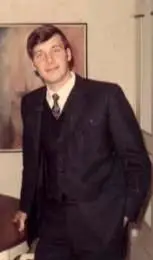 At the same time as all of this curriculum development, and reaching the limits of the ‘cafetorium’ at Nova, the ‘tenacious two’ came up with the idea of taking a show to Parker Playhouse. The first experiment with Parker Playhouse, the ‘real’ theatre, was ‘A Contemporary Revue’. This was a musical revue so the expenses were relatively low for costumes and sets. It was still quite a learning experience for everything from box office to lighting and stage managing. Once we did it (performed at Parker) we simply couldn’t settle for less in the future. Of course that would take money which was not readily available. At the same time as all of this curriculum development, and reaching the limits of the ‘cafetorium’ at Nova, the ‘tenacious two’ came up with the idea of taking a show to Parker Playhouse. The first experiment with Parker Playhouse, the ‘real’ theatre, was ‘A Contemporary Revue’. This was a musical revue so the expenses were relatively low for costumes and sets. It was still quite a learning experience for everything from box office to lighting and stage managing. Once we did it (performed at Parker) we simply couldn’t settle for less in the future. Of course that would take money which was not readily available.The PA school would not ask the general administration for money for a show anyway. So, Joyce and Allen did a budget projection and marched into the President’s office at Landmark Bank and made a proposal: “We would like you to open an account for Nova Performing Arts and put $5000.00 in it. With this money we will produce our first musical at Parker Playhouse and with the proceeds pay you back. If we fail to make enough to pay you back, we want you to write off the loss and close the account.” You know what? He said OK. The result was our first full musical on the Parker stage for 5 nights, Mame. About this time the program was attracting a lot of attention and the Nova ‘Special’ years were under fire from every direction (special has a way of not being acceptable in public schools). There was a real threat to the existence of the program so the parents rallied and formed the Nova Theatre Arts Parents Association, Inc. This was the first time in Broward County history that a parents association had incorporated. Normal parents associations were under the complete control of the school administration and in this case that was the enemy so incorporation was the way to go. The long fought compromise was ‘move the program to Dillard as a magnet school making it available to students from the entire county.’ This move came with the promise of a new PA building (of our design) and a new theatre.
|
